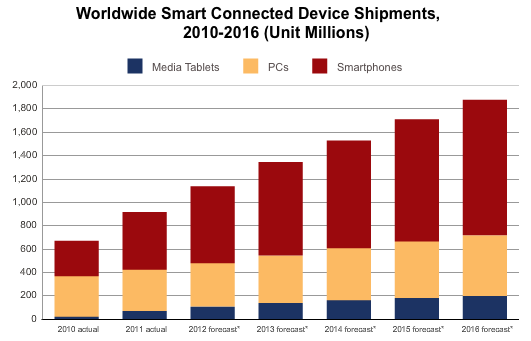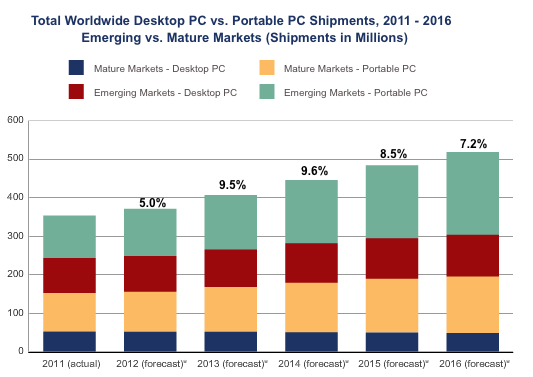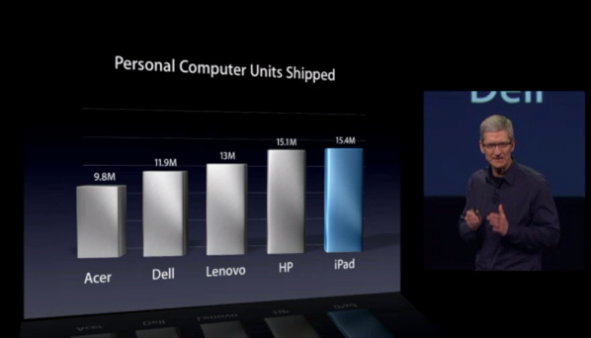It’s A “Post PC” World: Smartphones, Tablets Outpace Traditional PC Growth
IT consulting firm IDC has just released its latest hardware forecast. According to the firm, 2011 saw “shipments” of nearly 1 billion “smart connected devices.” By 2016 the number will grow to just under 2 billion. IDC uses the term “smart connected devices” very loosely; it includes everything: PCs, smartphones and tablets. Usually the term […]
IT consulting firm IDC has just released its latest hardware forecast. According to the firm, 2011 saw “shipments” of nearly 1 billion “smart connected devices.” By 2016 the number will grow to just under 2 billion.
IDC uses the term “smart connected devices” very loosely; it includes everything: PCs, smartphones and tablets. Usually the term “connected devices” refers to tablets and other internet-capable devices that are not PCs and not smartphones.
Source: IDC
Another gripe: the industry must banish “shipments” as a metric. Shipments don’t equal sales to consumers and enterprises. Only sales matter. Shipments often sit on retailer shelves. This was true for the RIM Playbook and for a most of Samsung’s Galaxy Tabs other than the 7-inch variety.
IDC appears to maintain the belief that the success of the iPad is a novelty and that consumers will “go back” to buying PCs in the near future. Based on consumer surveys they’ve conducted the firm asserts that once Windows 8 comes out later this year PC sales will immediately rebound. It’s not quite that simple.
Source: IDC
Despite the expected rebound in consumer PC sales, the firm believes that most future PC growth will happen in emerging markets. Mature markets like the US will be relatively flat according to the forecast.
Yet what we have now is a market of multiple devices where the PC is just one of several that people use to access the internet. Previously the PC was the only way to get online. Now people can use smartphones or tablets and many prefer those devices to the PC. Indeed, for many people non-PC devices will become “primary” and PCs “secondary” as a way to access the internet.
Last year the Pew Internet Project released survey data that showed 25 percent of smartphone owners went online primarily with their handsets. The number could be larger today. But if we assume it remained constant that would mean perhaps as many as 33 million people in the US today are going online mainly via their smartphones.
It’s also worth showing this slide again: more iPads were sold in Q4 than any single brand of PCs.
Enterprise PC sales will continue to be healthy. There’s no total replacement for the PC in the enterprise.
However the release of Windows 8 is not necessarily certain to spark massive consumer demand for PCs. The UI is radically different. It could be a big success or it could fall flat with consumers who no longer see an immediate PC upgrade as necessary — especially given the multiple alternative ways to get online. People might be quite content to allow their existing windows machines to break down before replacing them.
Before enterprise-facing research firms such as IDC take tablets (“connected devices”) seriously as a threat to the PC’s dominance there will need to be multiple successful devices in the market. Kindle Fire is the first non-iPad to post large sales. Google’s forthcoming 7-inch tablet, expected to meet or beat the $199 Kindle Fire price, is likely to be highly successful and could surpass the Kindle Fire in popularity because it will be more fully functional.
The combination of smartphones and multiple form-factor tablets will definitely dampen PC demand, as it already has, among consumers. Just as traditional media saw their audiences fragment with the rise of the internet, so too internet audiences are fragmenting across multiple screens — and marketers must follow. As Steve Jobs correctly asserted, we’re in a “post-PC” era. Time to get used to it.
Opinions expressed in this article are those of the guest author and not necessarily MarTech. Staff authors are listed here.
Related stories
New on MarTech


